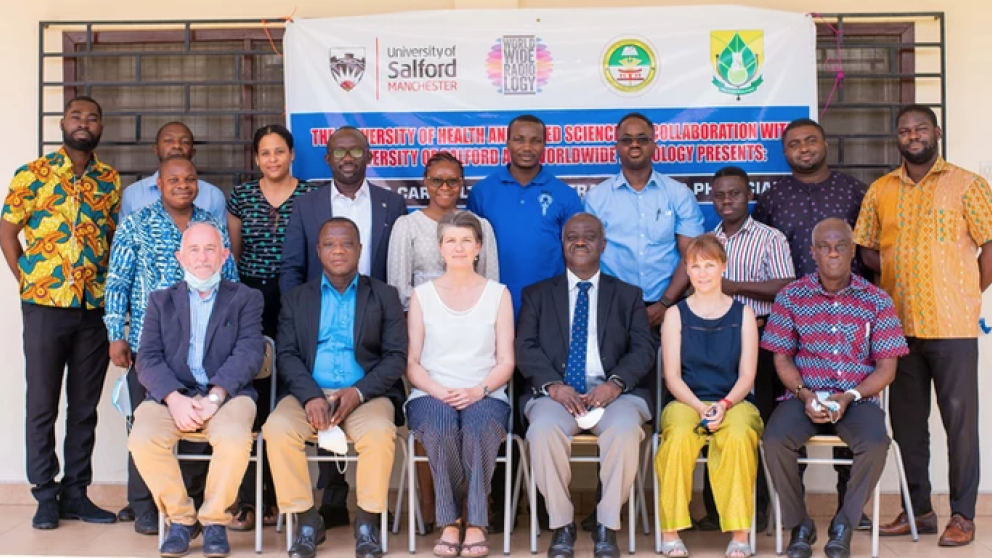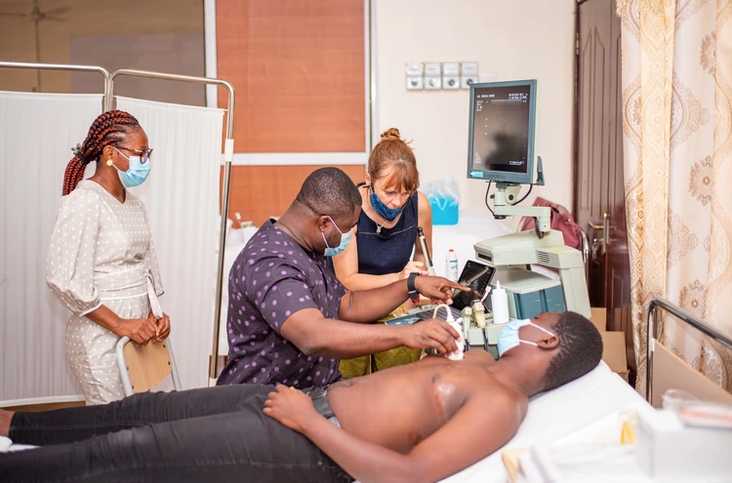Point of Care Ultrasound training pilot takes place in Ghana

A programme which trains clinicians in low-resource countries to use imaging machines has piloted in Ghana.

The Sound Sonography programme, which was developed with the help of the University of Salford, teaches participants how to use portable Point of Care Ultrasound machines (POCUS). These are more affordable than the larger ultrasound machines used in the UK and are regularly used here in emergency and intensive care, allowing staff to perform scans at patients’ bedsides.
For low-resource countries like Ghana, POCUS can be used not just for emergency care, but for general care too – as there may be no other imaging tests available.
The Sound Sonography programme, part of World Wide Radiology (WWR), was designed by a broad team of experts: radiologists and general physicians with extensive experience in Ghana and similar healthcare settings, academics at the University of Salford sonography training programme and POCUS specialists from emergency care, obstetrics and infectious diseases.
The first part of the programme was delivered online through the University of Salford e-learning platform. It was followed by a hands-on training block, hosted by Ghanaian partners at the University of Health and Allied Sciences in Ho.
The teaching delivered included topics such as emergency scanning in patients involved in accidents, in lung ultrasound (including for COVID and Tuberculosis), kidney ultrasound, abdominal vessels, and ultrasound-guided insertion of cannulas.
In between these training weeks, participants are supported remotely. Quality assurance of the module through the University of Salford and CASE, a UK based ultrasound approval body, gives participants and their patients the confidence that they have completed a quality programme.
“We expected the participants to be complete novices. In fact, many of the candidates had some limited experience with ultrasound, particularly echocardiography. This experience allowed them to learn more quickly; they already had some of the dexterity needed to handle the ultrasound probe,” an organiser at WWR said.
The participants had such a thirst for knowledge that the trainers had to adapt their learning materials - in some cases even rewriting the lectures to include more detail and more complex findings.
“The group wanted to and were clearly able to take their ultrasound skills to a high level. It was a joy to teach and work with such a motivated group,” the organiser continued.
The programme continues to provide support with active remote mentorship, and aims to deliver the second hands-on module, focussing on obstetrics and infectious diseases, later in the year.
Meanwhile, participants can upload anonymised cases onto a secure collaboration platform and will hold regular meetings with trainers for case discussion. This is to maintain their confidence and skills with ultrasounds.
Claire Mercer, Head of Radiology at the University of Salford said: “Our team at the University of Salford in Radiography have enjoyed supporting Worldwide Radiology on this project. It is fantastic to see what can be achieved when everyone works together; the participants we met certainly show great promise in this regard and we look forward to working with WWR in the future.”
Photo: Dr Bennett Owusu performing an ultrasound scan on the lungs of a healthy volunteer.
For all press office enquiries please email communications@salford.ac.uk.
Share:
